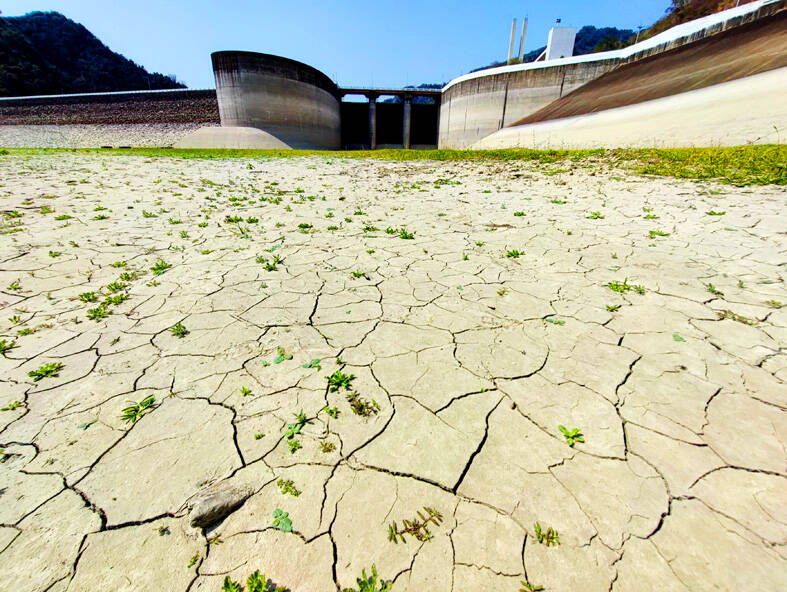The government should allocate a special fund of NT$70 billion (US$2.27 billion) to repair water leaks, as southern Taiwan is facing its most serious water shortage in three decades, Democratic Progressive Party (DPP) Legislator Lai Jui-lung (賴瑞隆) said yesterday.
The initiative would reduce the country’s water leakage rate from 13.1 percent to 10 percent or less and could be completed by 2029, Lai said.
Taiwan has faced extreme climate change in the past few years and the low water levels at most reservoirs in the nation’s south are low due to a lack of precipitation, which is worrying for residents and industries, he told a news conference at the Legislative Yuan in Taipei.

Photo: Wu Chun-feng, Taipei Times
“Kaohsiung raised its water alert level from green to yellow on Wednesday, which means water pressure would be reduced during off-peak hours,” he said, adding that Kaohsiung has not experienced more than 200mm of rain in a day for nearly 600 days.
“The Kaoping River (高屏溪) is the largest natural water source in the Kaohsiung and Pingtung regions, but it is only barely sufficient for municipal water supply,” Lai said. “We are facing a drought crisis, and the government’s priority must be water retention and reducing leaks.”
The average nationwide water leakage rate was 13.1 percent last year, accounting for a total loss of 415.18 million tonnes, equivalent to 27 times the capacity of the Agongdian Reservoir (阿公店水庫) in Kaohisung, or 4.6 times the capacity of the Nanhua Reservoir (南化水庫) in Tainan, Lai said, citing government data.
The high leakage rate increases operating costs for state-run Taiwan Water Corp and diminishes flow rates, “so we must allocate this special fund to get working on replacing old pipes in the municipal water supply network,” he said.
The government on Wednesday last week set up the Drought Contingency Response Center and it is developing programs to stabilize supply for southern regions, Water Resources Agency Deputy Director Huang Hung-fu (黃宏莆) said.
“At our agency, we are monitoring the daily situation closely,” Huang said. “We have a water supply shortage in the south, while north and central Taiwan are more stable.”
Leakage reduction programs over the past decade have lowered the rate to 13 percent, and it is projected to decrease to 12 percent next year and dip below 10 percent by end of the decade, he said.
The municipal water network was originally built using plastic pipes and after three to four decades of use, they are prone to cracking or bursting, Taiwan Water Corp general manager Lee Chia-jung (李嘉榮) said.
Pipe renewal programs are under way and local firms have been tasked with detecting supply lines that have high rates of leakage, Lee said.
To improve the engineering needed to reduce the leakage rate, the next phase of the project would require a bigger budget, he added.

The brilliant blue waters, thick foliage and bucolic atmosphere on this seemingly idyllic archipelago deep in the Pacific Ocean belie the key role it now plays in a titanic geopolitical struggle. Palau is again on the front line as China, and the US and its allies prepare their forces in an intensifying contest for control over the Asia-Pacific region. The democratic nation of just 17,000 people hosts US-controlled airstrips and soon-to-be-completed radar installations that the US military describes as “critical” to monitoring vast swathes of water and airspace. It is also a key piece of the second island chain, a string of

A magnitude 5.9 earthquake that struck about 33km off the coast of Hualien City was the "main shock" in a series of quakes in the area, with aftershocks expected over the next three days, the Central Weather Administration (CWA) said yesterday. Prior to the magnitude 5.9 quake shaking most of Taiwan at 6:53pm yesterday, six other earthquakes stronger than a magnitude of 4, starting with a magnitude 5.5 quake at 6:09pm, occurred in the area. CWA Seismological Center Director Wu Chien-fu (吳健富) confirmed that the quakes were all part of the same series and that the magnitude 5.5 temblor was

Taiwan will now have four additional national holidays after the Legislative Yuan passed an amendment today, which also made Labor Day a national holiday for all sectors. The Chinese Nationalist Party (KMT) and Taiwan People’s Party (TPP) used their majority in the Legislative Yuan to pass the amendment to the Act on Implementing Memorial Days and State Holidays (紀念日及節日實施辦法), which the parties jointly proposed, in its third and final reading today. The legislature passed the bill to amend the act, which is currently enforced administratively, raising it to the legal level. The new legislation recognizes Confucius’ birthday on Sept. 28, the

The Central Weather Administration has issued a heat alert for southeastern Taiwan, warning of temperatures as high as 36°C today, while alerting some coastal areas of strong winds later in the day. Kaohsiung’s Neimen District (內門) and Pingtung County’s Neipu Township (內埔) are under an orange heat alert, which warns of temperatures as high as 36°C for three consecutive days, the CWA said, citing southwest winds. The heat would also extend to Tainan’s Nansi (楠西) and Yujing (玉井) districts, as well as Pingtung’s Gaoshu (高樹), Yanpu (鹽埔) and Majia (瑪家) townships, it said, forecasting highs of up to 36°C in those areas